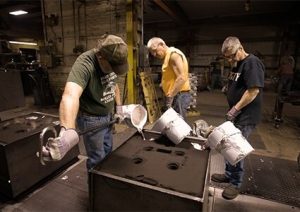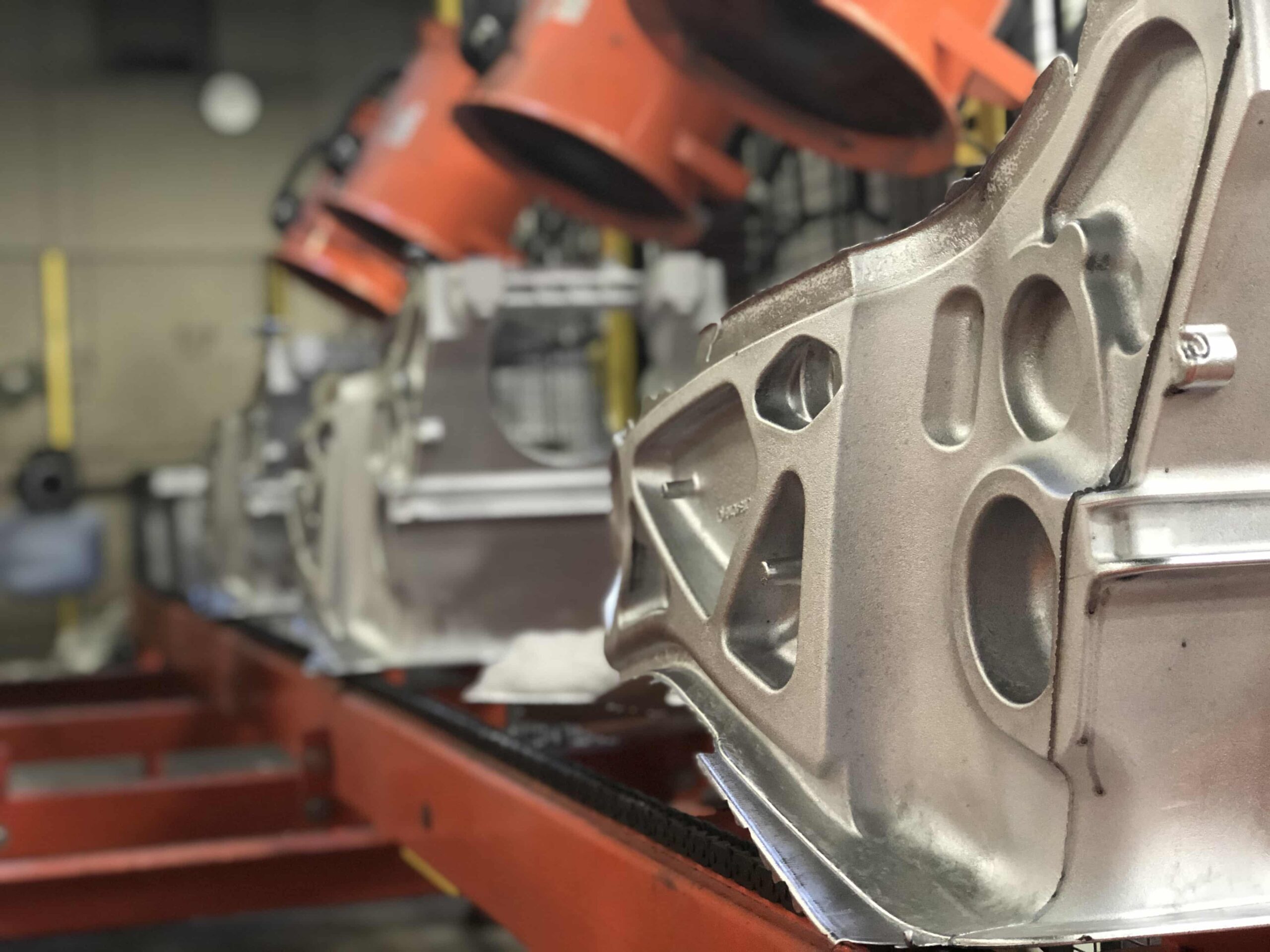Examining the Fundamental Properties That Make Aluminum Castings So Valuable
Wiki Article
A Comprehensive Guide to the Perks of Utilizing Aluminum From Foundries
Aluminum from foundries presents a series of benefits that make it a valuable material throughout numerous sectors. Its lightweight nature contributes to set you back savings in transport and enhances general item effectiveness. In addition, aluminum's amazing resistance to corrosion assurances long life and reduces upkeep requirements. Nonetheless, the advantages prolong past these elements (Wisconsin Aluminum Foundry). Understanding the complete range of aluminum's properties and their implications can reveal even much deeper insights into its duty in contemporary applicationsUnderstanding Foundry-Grade Aluminum
Foundry-grade aluminum is a specific product renowned for its outstanding residential or commercial properties and adaptability in different applications. This sort of aluminum is commonly created via regulated casting processes, enabling specific control over its make-up and microstructure. Therefore, foundry-grade aluminum exhibits remarkable mechanical properties, including exceptional stamina and rust resistance, making it ideal for requiring environments.In addition to its architectural integrity, foundry-grade aluminum can be easily formed into complicated forms, providing designers and engineers with adaptability in their projects. Its ability to hold up against heats further improves its allure for industries such as automotive and aerospace, where performance and reliability are critical. In addition, foundry-grade aluminum is usually recyclable, contributing to sustainability efforts. By utilizing this material, manufacturers can attain an equilibrium of performance, longevity, and ecological duty, making foundry-grade aluminum a favored option for a vast array of commercial applications.
Light-weight Properties and Their Advantages
The lightweight buildings of aluminum from foundries supply considerable advantages in various applications. Reduced transport expenses can be accomplished due to the lower weight, enabling extra effective logistics. Furthermore, the improved item performance stemmed from making use of lighter products can result in boosted capability and individual experience.Reduced Transport Expenses
Aluminum's light-weight properties greatly add to decreased transportation expenses, making it an attractive selection for numerous markets. When contrasted to much heavier products such as steel, aluminum enables lighter loads, allowing vehicles to carry more items efficiently. This decrease in weight can cause significant financial savings on fuel intake, as lighter cars call for much less energy to run. Furthermore, the capacity to carry larger quantities without surpassing weight limits improves logistical performance. Industries such as aerospace and vehicle benefit specifically from these advantages, as they can maximize shipping procedures and reduce general functional prices. Using aluminum from foundries not just simplifies transport but likewise sustains lasting techniques by minimizing carbon discharges linked with heavy freight transport.Enhanced Product Efficiency

Deterioration Resistance: A Secret Benefit
Aluminum from foundries supplies phenomenal rust resistance, primarily due to its all-natural oxide layer. This safety finishing forms when aluminum is subjected to air, avoiding further oxidation and deterioration. As an outcome, items made from aluminum can display durable sturdiness, making them optimal for numerous applications in challenging atmospheres.All-natural Oxide Layer
The natural oxide layer that creates on aluminum surfaces functions as an essential defense versus corrosion. This slim, transparent barrier creates when aluminum is exposed to oxygen, successfully shielding the underlying steel from various environmental aspects. The oxide layer is both durable and secure, making certain that aluminum retains its stability over time. Unlike other steels that may rust a lot more swiftly, aluminum's oxide layer avoids the development of corrosion and various other destructive compounds. This particular is specifically advantageous in industries where materials are subjected to wetness or extreme chemicals. The presence of the natural oxide layer adds significantly to the longevity and dependability of aluminum items, making it a favored option in many applications.Resilient Durability
While several materials catch the wear and tears and environmental exposure, the durable longevity of aluminum stands apart, mainly because of its outstanding deterioration resistance. This resistance is credited to an all-natural oxide layer that bases on its surface area, effectively protecting the steel from wetness, chemicals, and other harsh representatives. Unlike steel, which can rust and degrade in time, aluminum continues to be undamaged, making it perfect for various applications, including building, automobile, and marine sectors. Its lightweight nature, incorporated with longevity, enables lowered maintenance prices and longer lifespans in products. Aluminum from foundries provides a sustainable alternative that reduces substitute frequency, adding to both economic efficiency and ecological responsibility. This durability boosts its charm in numerous applications.The Recyclability of Aluminum
Offered click over here its substantial usage see this across numerous industries, the recyclability of aluminum provides a considerable ecological advantage. Aluminum can be reused forever without losing its homes, making it a prime candidate for sustainable methods. The reusing process needs just a fraction of the power required to produce new aluminum from resources, minimizing greenhouse gas exhausts and conserving natural deposits. In addition, the recycling of aluminum draws away waste from garbage dumps, adding to more efficient waste administration systems.
Cost-Effectiveness in Different Applications
Countless markets acknowledge aluminum's cost-effectiveness, making it a recommended option for different applications. Its lightweight nature minimizes transportation expenses and energy intake, substantially contributing to overall cost savings. In production, aluminum's malleability permits reliable shaping and forming, minimizing waste throughout manufacturing.Aluminum's toughness guarantees long life, which decreases the need for constant replacements and maintenance. The Discover More Here material's corrosion resistance additionally translates right into lower long-term expenses, as it requires much less protective covering and care contrasted to other steels.

Sustainability and Environmental Effect
Aluminum's cost-effectiveness is enhanced by its sustainability and favorable environmental effect. The steel is very recyclable, with approximately 75% of all aluminum created still being used today. This recyclability considerably decreases the requirement for basic material removal, decreasing energy usage and associated greenhouse gas discharges. Shops play a vital role in the recycling procedure, making use of innovative technologies to repurpose scrap aluminum efficiently.Furthermore, aluminum production from recycled material takes in only about 5% of the energy required for primary aluminum production. This considerable energy cost savings equates to reduce carbon impacts, straightening with international sustainability goals. Furthermore, aluminum's lightweight nature enhances gas efficiency in transport applications, better adding to minimized discharges throughout its lifecycle. As markets progressively prioritize sustainable techniques, aluminum from foundries arises as a positive choice, promoting ecological stewardship while sustaining financial growth.
Regularly Asked Concerns
What Are the Typical Applications of Foundry-Grade Aluminum?
Common applications of foundry-grade aluminum consist of vehicle elements, aerospace components, equipment, building and construction materials, and consumer items. Its lightweight nature, deterioration resistance, and superb mechanical residential properties make it appropriate for diverse markets and manufacturing procedures.Exactly How Is Foundry-Grade Aluminum Produced?
Foundry-grade aluminum is produced via melting aluminum scrap or ingots, complied with by alloying with various other metals. The liquified aluminum is then cast into mold and mildews, allowing it to strengthen into numerous shapes for varied applications.What Are the Safety Factors To Consider When Dealing With Aluminum?
Safety considerations when dealing with aluminum include proper ventilation to prevent breathing in dirt, use of personal protective tools to prevent skin get in touch with, and recognition of fire risks linked with molten aluminum during processing and casting.Exactly How Does Foundry-Grade Aluminum Contrast to Other Metals?
Foundry-grade aluminum provides a premium strength-to-weight proportion contrasted to lots of steels, alongside excellent rust resistance and thermal conductivity. Its adaptability and capacity to be conveniently shaped make it a favored option in different applications.What Upkeep Is Needed for Aluminum Products?
Aluminum items call for minimal upkeep, primarily involving regular cleaning to avoid oxidation and dust accumulation (Wisconsin Aluminum Foundry). Safety finishings may improve toughness, while routine examinations can assure architectural stability and deal with any type of wear or damages immediatelyFoundry-grade aluminum is a specific material renowned for its extraordinary buildings and convenience in numerous applications. Leveraging light-weight residential properties, aluminum enhances product efficiency throughout different applications. Unlike steel, which can rust and degrade over time, aluminum continues to be intact, making it perfect for different applications, including building and construction, auto, and marine industries. Aluminum manufacturing from recycled material consumes just about 5% of the power required for primary aluminum manufacturing. Foundry-grade aluminum is created through melting aluminum scrap or ingots, adhered to by alloying with various other metals.
Report this wiki page